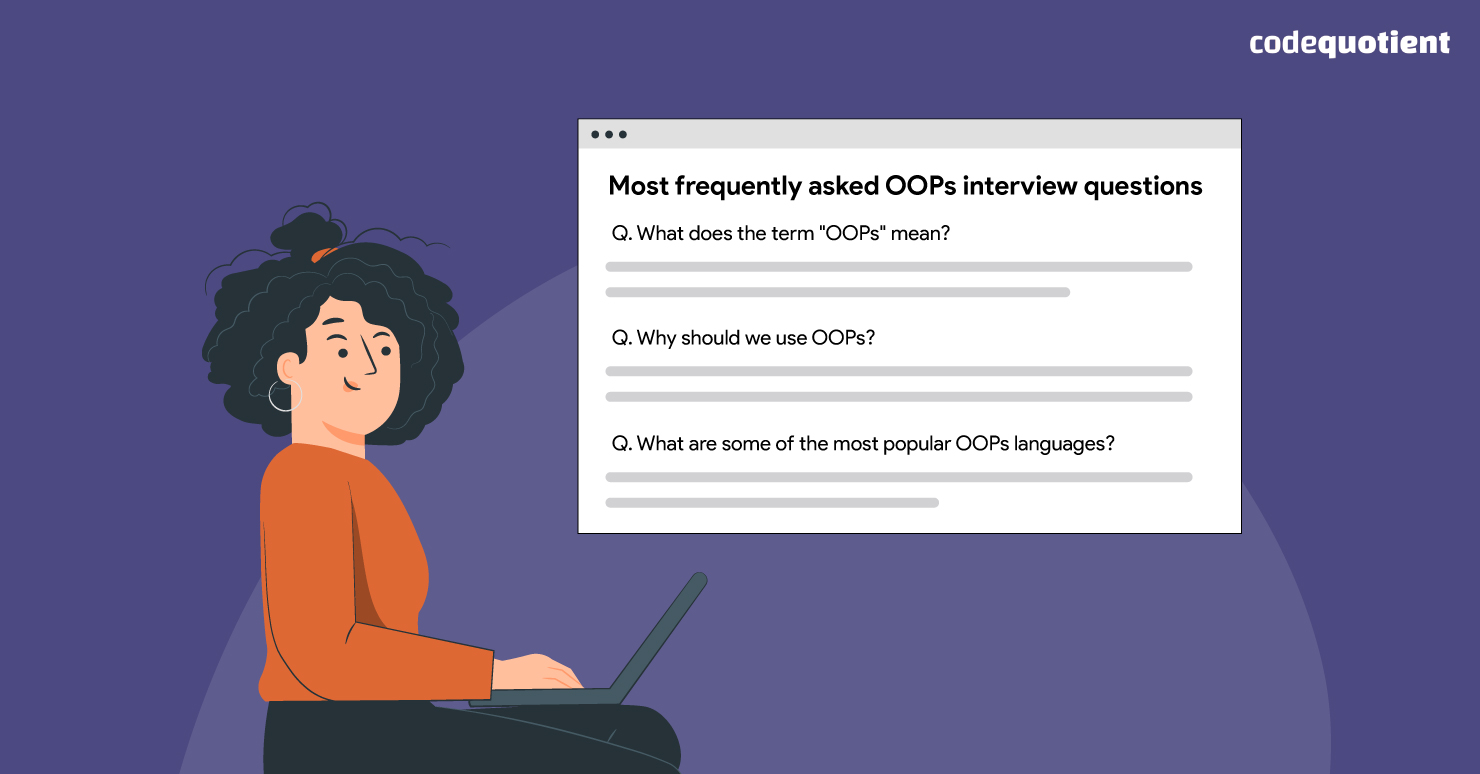Object-oriented Programming (OOPs) is one of the most foundational concepts in programming. Object-oriented programming is a programming methodology that focuses on objects. Objects are data structures that contain both data and functions.
In object-oriented programming, the programmer defines the types of objects they want to use and then how they interact with each other. The programmer can reuse code using inheritance and polymorphism, allowing them to create new classes from existing classes without redoing the entire program.
This article compiles the most often-asked OOPs interview questions. The list is perfect if you are a recent graduate or interviewing for a role that requires knowledge of OOPs.
Most Frequently Asked OOPs Interview Questions:

1. Why Should We Use OOPs?
OOPs is popular for numerous reasons, but here are the most significant ones:
- OOPs makes it easier to understand code and solve complex problems.
- By inheriting from parent classes, developers can share and reuse code and cut down on duplication.
- Encapsulation keeps information and programs together.
- With OOPs’ data-hiding capabilities, you can maintain data confidentiality.
- It’s easy to find solutions to problems when they are broken down into two or more elements.
- Polymorphism is a technique in OOPs that allows us to create a single name for many different functions.
2. What are Some of the Most Popular OOPs Languages?
Object-Oriented Programming languages are those that use and implement the OOPs programming paradigm. These are a few examples of popular Object-Oriented Programming Languages:
- Java
- C++
- Javascript
- Python
- PHP
3. What are the Most Distinguishing Characteristics of OOPs?
The four key components of Object-Oriented Programming are as follows:
- Inheritance
- Encapsulation
- Polymorphism
- Data abstraction
4. What Exactly is an Object?
The “object” refers to a specific instance of a class. In OOPs, an object is just a self-contained part that has properties and methods to make a particular type of data helpful. Sending a message to an object causes it to perform one of its methods, as specified by the class’s definition.
5. What Does a Class Mean?
A Class is a user-defined data type with member functions and data members. Data members are the data variables, & member functions are the methods used to change these variables. Together, the properties and behaviors of the objects in a Class are set by the data members and member functions.
6. What is Inheritance, and What Are Its Different Types?
In OOPs, inheritance is a function that allows classes to take common features from other classes. If you have a class called “vehicle,” for instance, additional classes like “car” and “bike” can share some characteristics with it. Using this feature, you can eliminate unnecessary lines of code and make your program more compact.
The different kinds of inheritance are as follows:
- Single inheritance
- Multiple inheritances
- Multilevel inheritance
- Hierarchical inheritance
- Hybrid inheritance
7. What Does Polymorphism Mean?
The term “polymorphism” refers to having several forms. In simple terms, polymorphism means that a message can be represented in more than one way. Consider the “Animal” as the base class, which has a method called “AnimalSound.” Animals with derived classes could be Pigs, Cats, Dogs, or Birds. Each of these classes has its way of making an animal sound, such as the cow moo, the pig oinks, etc.
8. What Does “Encapsulation” Mean?
Encapsulation means that when an object is created, it has its own set of properties and methods, which may or may not be accessible outside of the object’s definition. It helps keep code organized by grouping similar functionality together in one place instead of having it scattered throughout a program. It also helps keep information safe by hiding it from other parts of the program until it is needed.
9. What Are Constructors?
A constructor is a special method called every time a new class object is built. Use the exact name of the class followed by parentheses to make a constructor.
10. Define Data Abstraction.
Data abstraction refers to delivering essential data to the outside world and concealing their background information, i.e., representing the required data in a program without displaying the background information.
The principle of data abstraction in programming (and design) is to keep the interface and program implementation distinct.
For instance, if you’re riding a bike, you see that if you press the accelerator, you’ll gain speed, but you have no idea how this occurs.
Practice Makes Perfect
This article is an excellent last-minute review of the OOPs interview questions for your next interview. It takes time to become proficient in object-oriented programming.
Want to master object-oriented programming and be a SuperCoder? Joining CodeQuotient’s SuperCoders Program is the ideal way to speed up the process.
The SuperCoders Program is a three-month course that will facilitate you to become a better developer in the area that interests you. The innovative CodeQuotient’s SuperCoders Program aims to mold learners into competent and successful members of the technology workforce. Apply today to build a name for yourself in software engineering.




